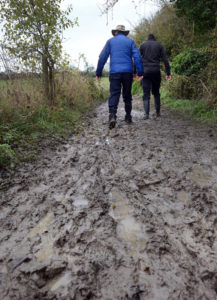Words of wisdom: Exploring the “muddy” history of Sussex
November 11, 2019
Mud – there’s a lot of it around at the moment!
And, like it or loathe it, when it’s stuck to your walking boots, you know you’ve had a great walk in the countryside.
But there’s more than meets the eye to this simple three-letter word – especially in Sussex! In fact, you’ll never be stuck for a word for mud in the South Downs, thanks to the county’s rich dialect.
Sussex is said to have at least 30 different words for mud. Although use of the Sussex dialect has waned in recent decades, many of these wonderfully-descriptive words still linger on.
It’s no surprise that an area like Sussex, containing both the Downland (chalk hills) and the Weald (lower areas of farmland, once populated by forest and woodland), would invite plenty of different descriptions for mud.
 Some of the words you may hear around certain parts of Sussex include:
Some of the words you may hear around certain parts of Sussex include:
- Clodgy – muddy and wet, like a field path after heavy rain
- Gawm – especially sticky, foul-smelling mud
- Gubber – black mud of rotting organic matter
Ike – a mess or area of mud - Pug – a kind of loam, particularly the sticky yellow Wealden clay
- Slab – the thickest mud
- Sleech – mud or river sediment used for manure
- Slob – thick mud
- Slough – a muddy hole
- Slub – thick mud
- Slurry – diluted mud, saturated with so much water that it cannot drain
- Smeery – wet and sticky surface mud
- Stoach – to trample ground, like cattle; also the silty mud at Rye harbour
- Stodge – thick puddingy mud
- Stug – watery mud
- Swank – a bog
So next time you’re out on a ramble, try and see which of the above best describes the muddy path in front of you!
